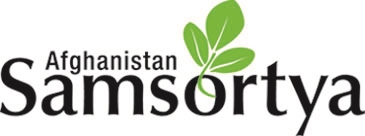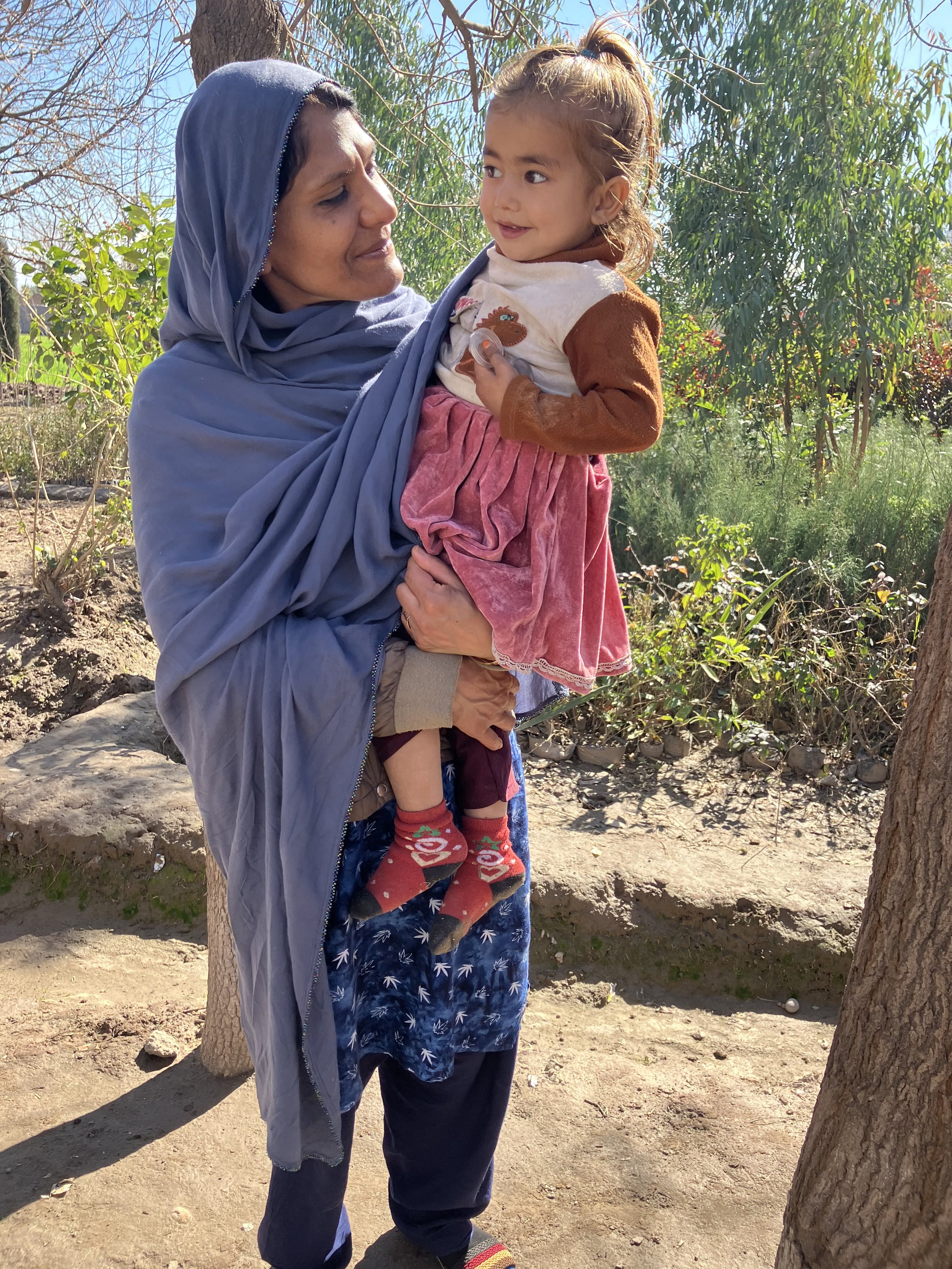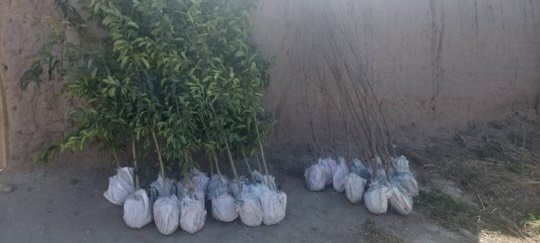Spring 2023 Newsletter
Dear Family and Friends,
I have just returned from a remarkable trip to Afghanistan. During my 35-day stay in Afghanistan, I had the honor and privilege of personally reconnecting with colleagues and communities with whom I've collaborated for nearly 20 years. I was greatly heartened by this reconnection with long-time friends, as well as by the new friends and partners I met during my trip. I was able to travel to far corners of Nangarhar Province, in eastern Afghanistan, where I met with school teachers, students, farmers, and provincial administrators and others who are wholeheartedly active in constructive programs to rehabilitate their communities.
I was profoundly impressed by the collective effort I observed among these citizens from all walks of life, and the vigor, discipline, and comradery with which they approached their responsibilities - in spite of their humble financial means. Driven by a deep sense of purpose, my colleagues and I were happy to incorporate Afghanistan Samsortya's resources and expertise in the projects described below.
Health Studies Program- Nursing, Midwifery, and Pharmacy
We currently have 29 students in our Health Studies Program, which includes the areas of nursing, midwifery, and pharmacy. Students are currently working hard to prepare for their end-of-the-semester exams. Please join me in wishing them success on their exams! I was approached by many young people and their families who petitioned me to provide them with scholarships to our Health Studies Program. After consulting our financial budget, my colleague Nasratullah and I added six candidates to the program. This expansion was accompanied by a promise that upon my return to the United States, I would turn to you - my friends and supporters – to provide Samsortya with the financial support that will allow us to grow our capacity to provide scholarships to bright young Afghans. On an individual level, these scholarships are life-altering for the students, but they’re also of profound value to the well-being of the communities to which these young people belong. Our young graduates represent Afghanistan’s diverse population and come from approximately 20 provinces. As a result of their new training, they now work in clinics, hospitals or in small practices they have established in the province. Hosai is a second-semester student in the Program and a resident of Kabul. She and her siblings live with their mother. Unfortunately, their father, the family's sole provider, was a casualty of the war a few years ago. Hosai is doing very well in her studies, typical of our students who graduate with high marks. In a moving conversation, she told me she would support her mother and younger siblings after graduating from the midwife program.
Saffron Cultivation Project
Last year we began a partnership with the Department of Agriculture at Nangarhar University to establish a research program dedicated to studying Saffron cultivation. This spring we identified a second space to carry out this groundbreaking and exciting work.
Trees and Gardens
In recent weeks, we donated thousands of trees from our three nurseries to diverse communities in Nangarhar Province, a region that is home to two million people. In addition, our precious saplings were sent to the neighboring provinces of Laghman and Logar Provinces, and a group of exotic plants, trees, and flowers found a new home among communities in Kabul. Folks expressed joy and reverence when requesting or receiving trees, an obvious indication that the relationship between humans and nature is founded on harmony and respect. A beloved neighbor in Jalalabad, Sima, visited me one-afternoon expressing interest in receiving trees and flowers. Sitting with her in the courtyard of my aunts' home, I asked her what type of trees she might like. A dignified lady in her middle age, she gracefully responded that she would welcome fruit trees and trees that provide shade. She continued that her favorite pastime is to water the flowers in her small garden, and that she has conversations with her flowers as though they were real beings. Did I find her behavior strange, she asked in an emotional tone? I replied that I did not find her statement or her behavior strange at all, and that I share the sacred relationship she has with plants and trees, and regard them as real beings. Trees are life, and they heal broken hearts and traumas.
The next day, I arranged a delivery of trees and plants to Sima’s home, that included fig, loquat, sour orange, mulberry, guava, and eucalyptus trees, along with a combination of gorgeous potted flowers. That made my day! Also last month, Samsortya delivered dozens of trees andflowers to Kot High School. A colleague and I visited the campus and were welcomed by the teachers, administrators, and students with enthusiasm, curiosity, and openness. I loved the energy on campus and wished I could stay the entire day to visit with the students. I walked away with a memory that I would hold close to my heart of the children with bright, intelligent faces looking at me curiously. I wonder what they thought about me. I wanted to convey my love and respect to them and let them know that I dream of a beautiful and safe world where they may thrive. I imagined meeting them ten years into the future as extraordinary and capable adults living in a peaceful Afghanistan. What potential these precious children hold!
We expanded our date tree nursery to a second location in Soor Rud. We are now keeping a mother stock of 100 date trees to propagate for future distribution. I am very excited about this venture given the high nutritional value that dates possess. Another noteworthy Samsortya expansion is in Kot District headquarters of Nangarhar Province. We outfitted the center's well with solar panels, pipes, and other equipment, and contributed dozens of trees and flowers to beautify the Kot District's town hall. In our three nursery spaces, we started tens of thousands of trees from seeds and cuttings, where they will be cared for and nurtured by our four nursery employees and readied for transplanting in the future. My colleagues and I were pleased to collaborate with Afghanistan's Ministry of Urban Development for the beautification and greening of the ministry's campus in the Microyan area of Kabul. We provided trees and flowers from our nurseries and shared our expertise with the design and planning of the landscaping of the Ministry grounds. In the coming months, my colleagues and I will discuss opportunities for further collaboration with our growing list of partners to create green spaces in Kabul and other provinces.
We sincerely hope that the wisdom we’ve gained from almost two decades of working and thriving in Afghanistan will sustain grand projects that will beautify the country and impact the physical and mental health of millions of people. Indeed we view gardens as mental health counseling centers - places where people who have experienced severe PTSD can heal from their trauma and through which their souls, as well as their bodies can be nourished. I am reminded of sweet Sima's emotional reaction to the lovely flowers in her garden. She speaks with them as though they were her companions. Just as the flowers comfort her, you can take comfort in supporting Samsortya and extending comfort to people like Sima and our sweet friends at Kot High School.
With love and gratitude,
Mariam
P.S. Here are a few ideas on how and your communities can help Afghanistan Samsortya:
1) Make a donation by mail or online to provide critical financial support to sustain and grow our programs. Checks can be mailed to our address at 200 Swanton St, Winchester, MA 01890.
2) Arrange speaking events where I may introduce Afghanistan Samsortya’s work to members of your school, church, library, or other group. These discussions could be held on specific days, like Earth Day, Women’s Day, and Nowruz (Spring Equinox).
3) Introduce our work to funders who might be interested in supporting our projects.
4) Donate your time and expertise to support our efforts in grant writing, video editing, and website design, agriculture/permaculture, nutrition, medicine, and education.
If you have ideas of your own, please do not hesitate to share them with me!
How do your contributions help?
$30 provides 2 trees for an Afghan family
$50 provides 4 trees for a family and its children
$100 provides 10 trees to revitalize a neighborhood in Afghanistan
$250 provides 25 trees to give fuel, shade, and food to an Afghan community
$500 provides 50 trees of various species to sustain a community in Afghanistan
$1000 provides 100 trees to renew and heal the local ecosystem, as well as offer opportunities for employment to local Afghans
$1500 provides one well for a community in need of fresh, potable, and accessible sources of water



